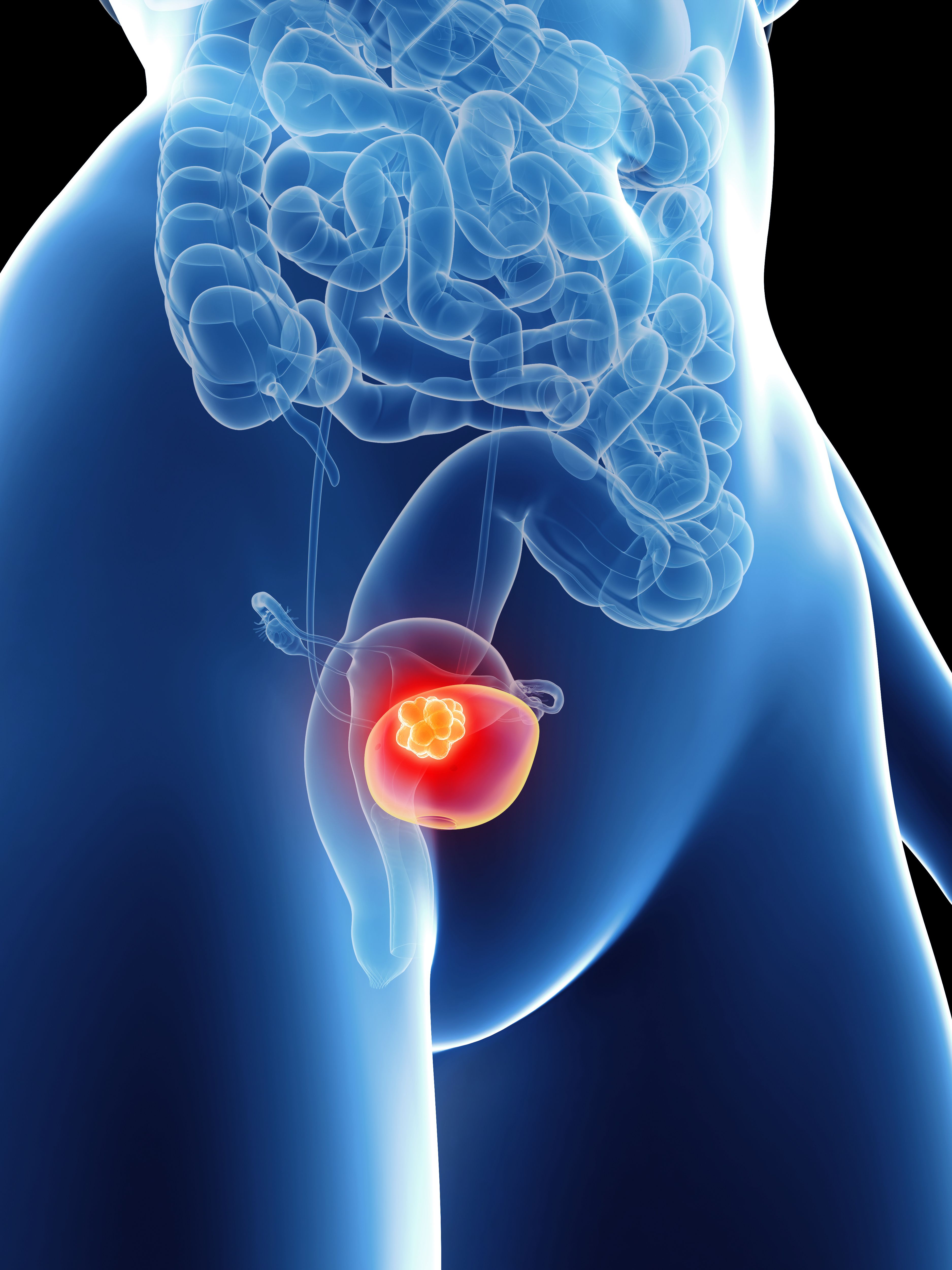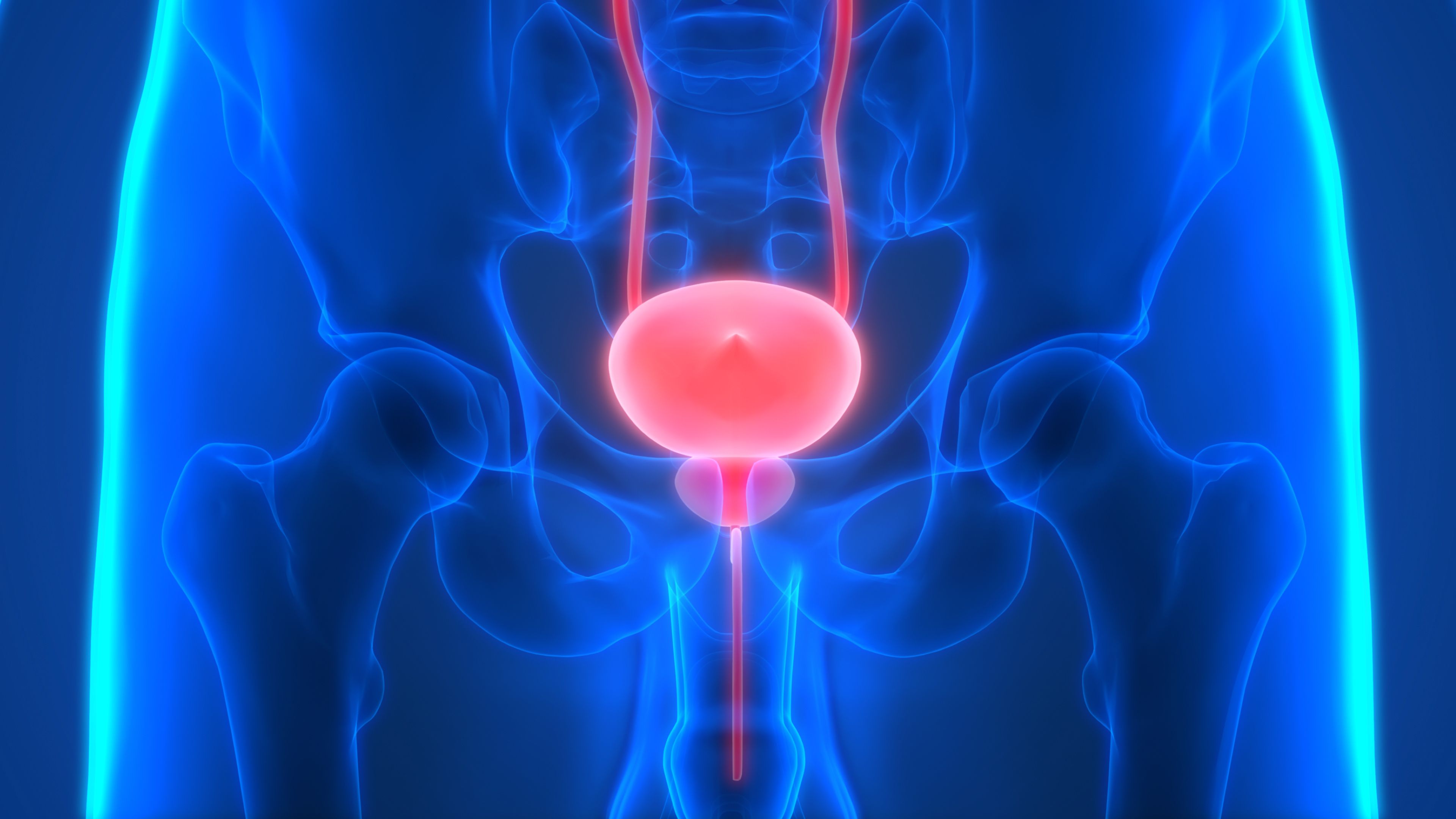EG-70 Elicits Promising Complete Responses in NMIBC
EG-70, a novel, nonviral gene therapy, elicited a 73% complete response at any time for patients with non-muscle invasive bladder cancer (NMIBC) with carcinoma in situ.
3D anatomical illustration of bladder cancer: © vitanovski - stock.adobe.com

EG-70 (detalimogene voraplasmid), a novel, nonviral gene therapy, elicited a 73% complete response (CR) at any time for patients with non-muscle invasive bladder cancer (NMIBC) with carcinoma in situ (CIS). Findings from the phase 1 dose-escalating portion and interim phase 2 data of the LEGEND study (NCT04752722) were presented by Gordon A. Brown, DO, at the American Urological Association 2024 Annual Meeting in San Antonio, Texas.
“At the dose selected for the pivotal phase 2 portion [n=10] we see [the] CR rates were 70% at 3 months and 60% at 6 months and with a very reasonable treatment adverse event [AE] profile, [which is] consistent with intravesical administration and catheterization placement,” Brown said in the presentation. Brown is clinical associate professor of urology at Jefferson Health. He is also director of New Jersey Urology’s Center for Advanced Therapeutics and program director of urologic surgery at Rowan University School of Osteopathic Medicine.
In phase 1 of the LEGEND trial, investigators evaluated patients (n = 24) with high-risk NMIBC CIS who failed Bacillus Calmette-Guérin (BCG), reporting at 3 and 6 months a complete response of 68% and 45%, respectively, for all doses in 22 of the patients evaluated. The duration of response for 3 months and more was 73% for all doses, and at 6 months or more it was 60% for the same 22 patients.
According to investigators, in phase 1, 24 patients received 1 or more doses of the agent by intravesical administration and were evaluable for safety; however, results from 22 patients were included in the efficacy dataset. At the time of the presentation there is phase 2 data for 10 patients.
Patients in phase 1 of the trial received 2 or 4 doses over a 12-week period in a 3+3 dose escalation design. This included 3 dose levels: 0.25 mg/mL, 0.8 mg/mL, and 2.5 mg/mL.
“Additionally, we chose to assess appropriate dosing intervals as well as dose for the pivotal phase 2 trial. Once patients completed the phase 1 portion, they were offered the ability to continue on,” Brown said.
In phase 2 of the trial, the dosing schedule increases to 4 0.8 mg/mL at weeks 1, 2, 5, and 6 in a 12-week cycle. In this phase a second cohort is evaluating patients who are BCG-naive, intolerant, or who were not adequately treated with BCG.
As an exploratory end point in the phase 1 trial, “we evaluated the transgene expression of IL-12 in the urine of patients who received EG-70 installations,” Brown said. At baseline, there was no detection of IL-12 found in the urine. However, after the first and second doses, IL-12 levels began to rise rapidly, he explained, and after the second dose, there was no further increase in IL-12 detected. “Between dose 2 and 3, we see IL-12, excreted in the urine [for] up to 64 days after exposure to EG-70 and we see no plasma levels of IL-12 at any point [for] any patient suggesting [that] there’s no systemic absorption of IL-12,” Brown said.
In the phase 1 portion of the trial, the majority of patients were male (75%), and the median age was 74.4 years (range, 53 - 91). There were 83.3% of patients who were older than 65 years, and the percentage of patients with an ECOG status of 0 and 1 was 87.5% and 12.5%, respectively.
3D illustration of human bladder: © magicmine - stock.adobe.com

The primary end point of the trial was safety with a secondary end point of efficacy assessed at 3 months. For the phase 2 portion of the trial the primary end point is complete response rate at 12 months, and secondary end points are safety and durability.
The most common treatment related AEs (TRAEs) reported in phase 1 were hematuria, urinary tract infection, and micturition urgency. Four patients experienced grade 2 events with 2 patients reporting urinary tract infections and 1 patient, micturition urgency.
There was only 1 grade 3 TRAE, which was renal failure. However, it is important to note that this patient had a history of renal failure as well as obstructive uropathy accompanied with the presence of bilateral hydroureteronephrosis at screening. Enrollment criteria was later modified and now excludes patients with a history of unresolved vesicoureteral reflux, indwelling urinary catheter, or unresolved hydronephrosis due to ureteral obstruction, according to investigators.
There were no reported grade 4 or 5 TRAEs, and, to date, mainly grade 1 and 2 AEs have been observed.
EG-70 is an experimental intravesical immunotherapy that does not involve viruses or integration. It aims to eliminate tumors by triggering coordinated innate and adaptive immune reactions specifically within the bladder.
Activation of the innate immune system involves the use of dual RIG-I agonists. This combination enhances natural killer cell activity and reduces suppressor cell function, leading to effective tumor destruction. It also encourages the recruitment of T-cells and the presentation of neo-antigens. Activation of the adaptive immune system is achieved through the secretion of IL-12. This cytokine response, dependent on T-cells, enhances tumor destruction and fosters immune memory. By producing IL-12 restricted to the bladder, there's the potential for a robust therapeutic effect while minimizing the risk of systemic side effects.
“The pivotal phase 2 portion of the trial is open and accruing [and is] currently looking for active patients as well as open investigation sites. This is a single arm, open label trial, which is expected to be updated early [to] middle of this year,” Brown said.
REFERENCE:
Kalota S, Joshi S, Bui M, et al. LEGEND: A phase 1/2 study of EG-70 (detalimogene voraplasmid), a novel non-viral intravesical gene therapy for patients with BCG unresponsive non–muscle invasive bladder cancer with carcinoma in situ (CIS). Presented at: 2024 American Urological Association Meeting; May 3-6, 2024; San Antonio, TX.
Darolutamide Becomes Routine Doublet and Triplet Option in Hormone-Sensitive Prostate Cancer
May 6th 2024Darolutamide has been adopted routinely in clinical practice as a component of both doublet and triplet regimens for the treatment of patients with metastatic hormone-sensitive prostate cancer.
Read More
Responders to UGN-101 Have Positive RFS in Upper Tract Urothelial Cancer
May 5th 2024In patients at 15 centers who had upper tract urothelial cancer, those with no evidence of disease after UGN-101 induction had a 68% rate of 3-year recurrence-free survival, and this outcome did not differ based on tumor status, method of instillation, or treatment intent.
Read More